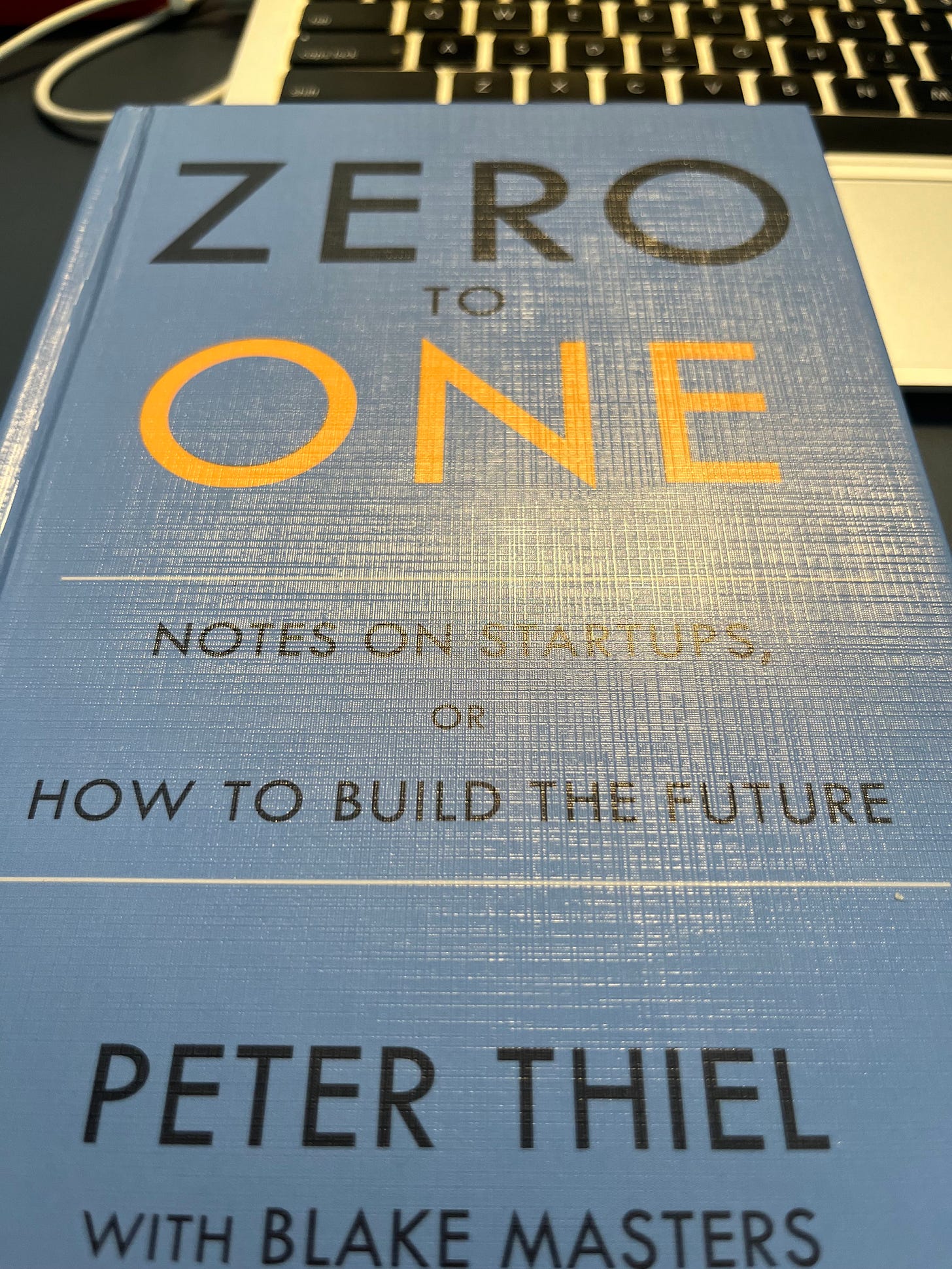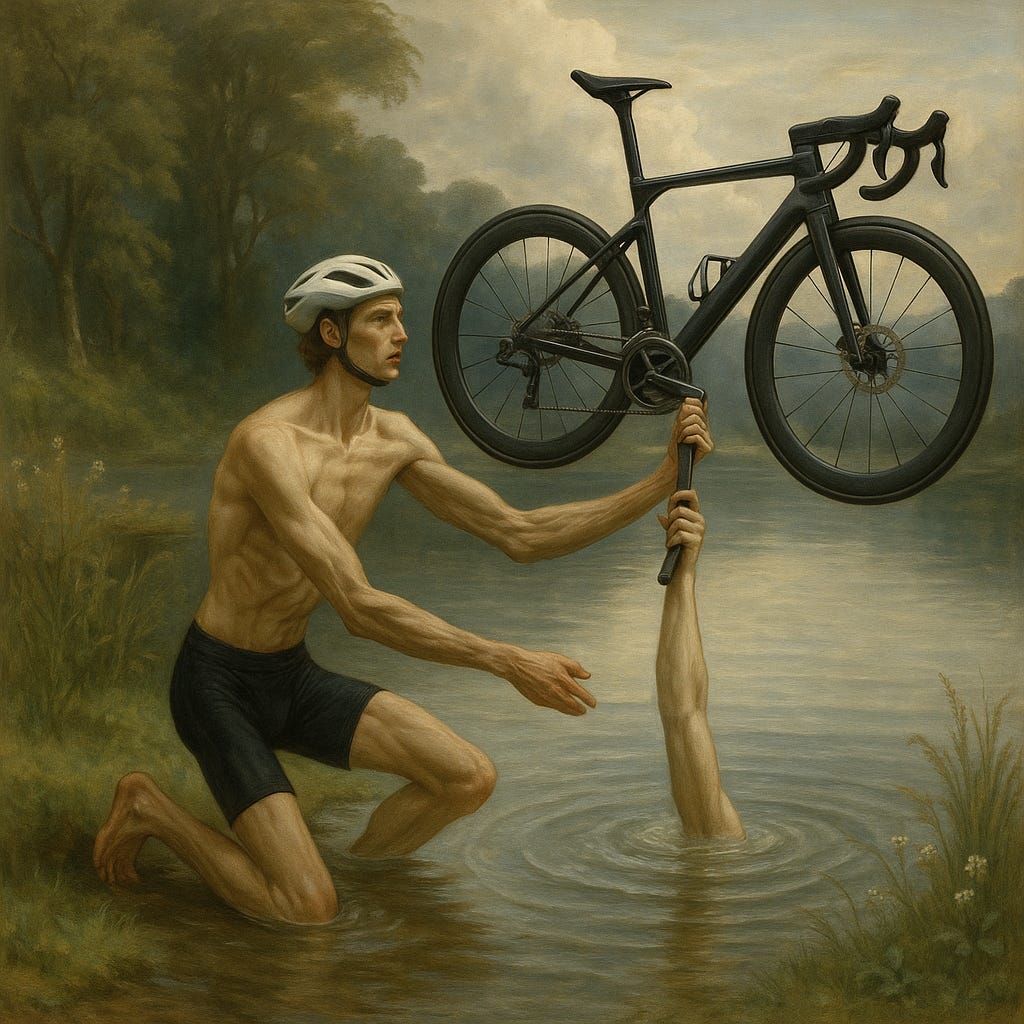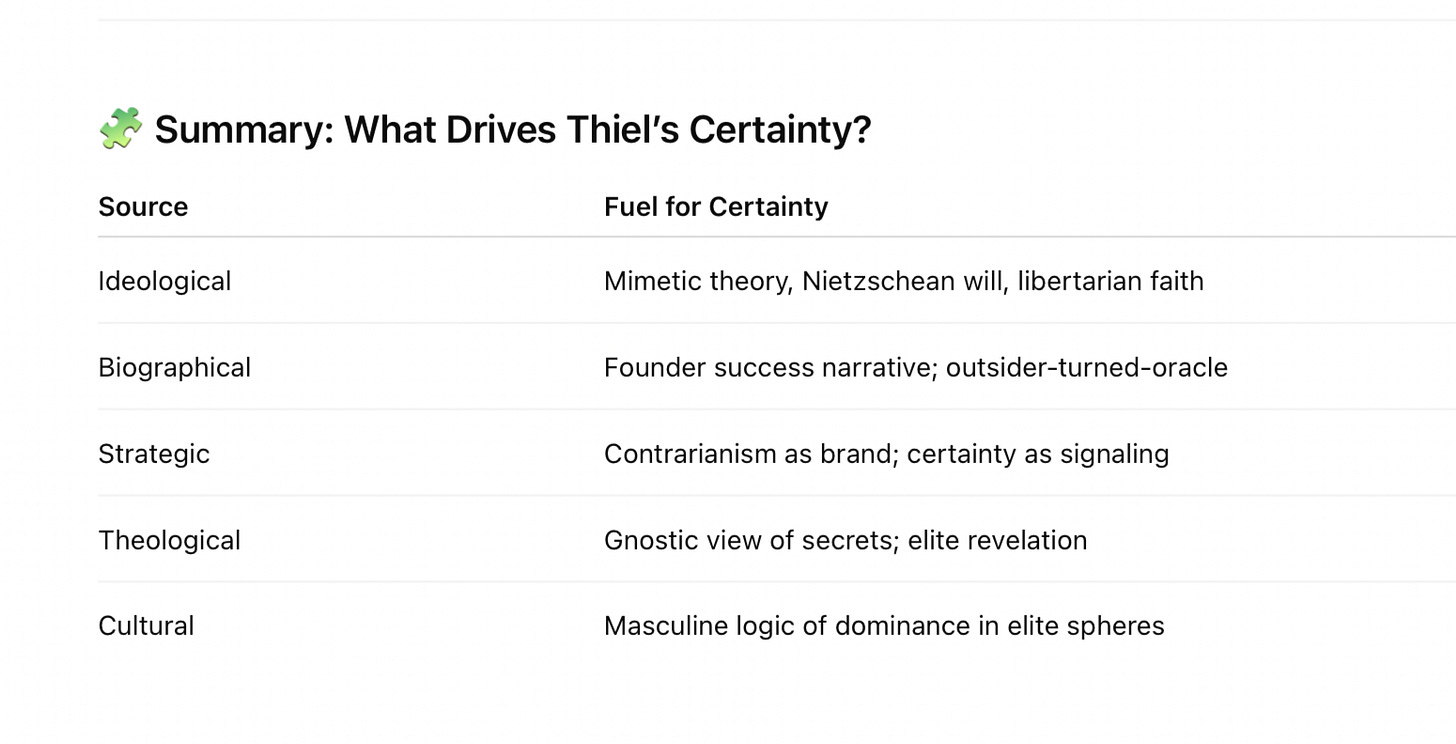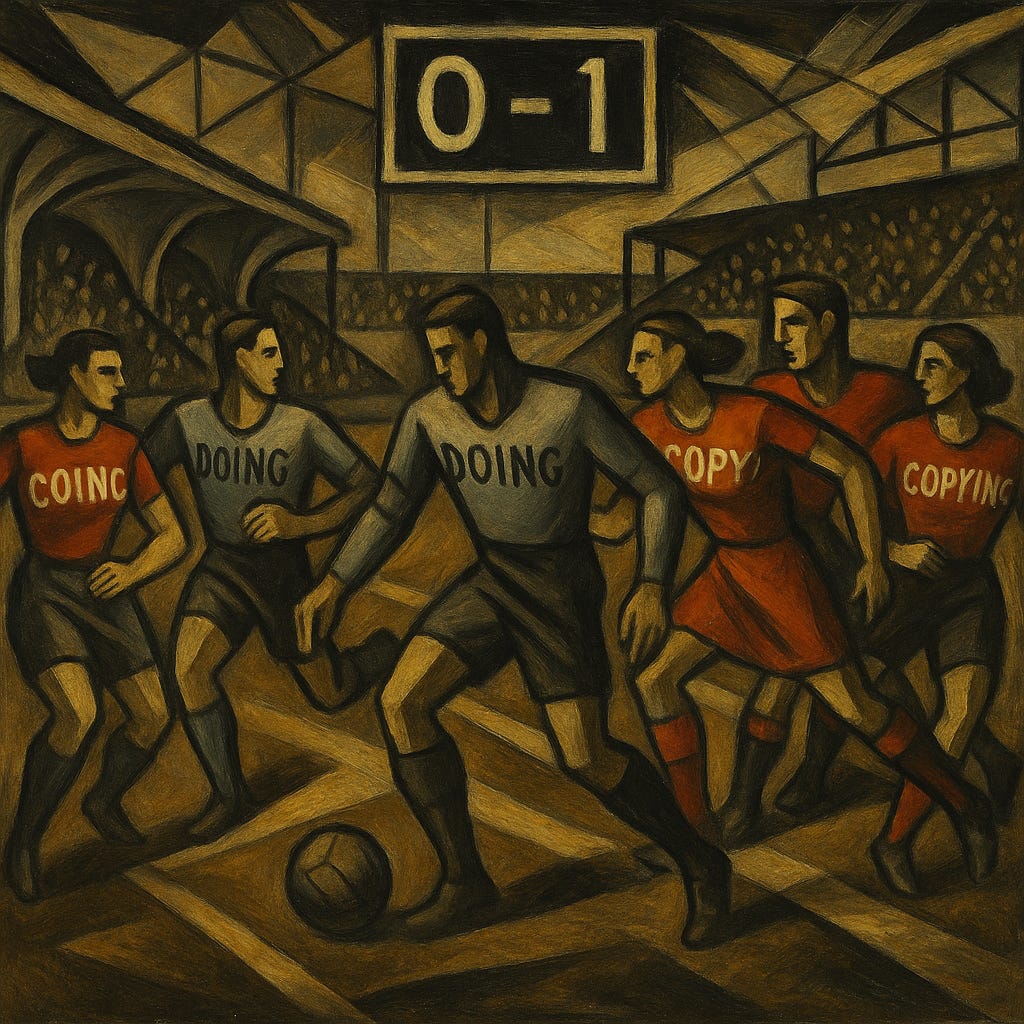Welcome to this week’s Hard Books. A deep – and now much shorter ! – dive into the stormy currents of reading difficult books. These I swim alongside with my personal floatation tank and reading group, ChatGPT.
Last week I read Fourth Wing, a Romantasy. This week, Zero to One, a different kind of fantasy classic. A Gospeltarian tract, no less – I just made that new genre up, btw – just for BookTok. But the point is: this is a very important old business book, a VIBB, which a lot of people have never heard of, let alone, read.
Live at Rare Books and Music at the British Library, London.
There are, in the more recent public outings of the author, entrepreneur and deep-thinker Peter Thiel, a German-American technocrat of some renown, something of the essence of pre-scandal Lance Armstrong, one feels. A pinched if sinewy presumption. The barely sublimated saintly aggression of one who cannot be passed, and certainly not by the masses in the chasing peloton group, however steep the great hill climb of life. Because – simply – Peter has got the best juice and wheels, and stamina.
He is very youthful 58 year old Dorian Gray to Steve Bannon’s pustular picture in the attic.
Thiel’s interviews have always displayed the supreme religious conviction of a lean and long-time winner. He is, after all, the Prometheus of Paypal and Palantir, and the Faust of Facebook. He’s Svengali to J.D Vance’s Trilby, as well, sitting him right on the big sofa of power this year – from where he’s been able to survey the leafy terrains of President Trump’s increasingly walled New Eden.
Graphics by ChatGPT
Anyway, this week we’re considering Peter Thiel’s De Profundis, his Augustinian Confessions. It’s called Zero To One, and is a slim volume of pensées. College lectures he gave at Stamford University a decade and a half ago in the general direction of many, including a young student named Blake Masters, a loyal apostle who – happily for us – wrote some of the wise words down.
(These days Mr Masters, a catholic father of four, and described by the Washington Post as one of the “worst candidates of the 2022” senate elections, and a former President of the Thiel Foundation, is a venture capitalist).
On the back of my British Library edition of Zero to One, Elon Musk and Mark Zuckerberg sleepwalk bland copy about value in the world, and a man named Nassim Nicholas Taleb – known for his Black Swan theory, and the concept of antifragility – suggests we read the book three times, to be safe.
This is a Classic.
Ok then – first time. I show the cover to ChatGPT. [The book was published in the UK in 2014.] And we’re off, semiotics first.
ChatGPT writes: ‘The cover of Zero to One immediately signals a techno-futurist manifesto dressed in minimalism: cool blue background, crisp typography, and the punchy subtitle— Notes on Startups, or How to Build the Future. There’s a boldness here: not just starting a business, but shaping time itself.
"Zero to One" as Theogony
The title itself implies creation ex nihilo — a leap not from one to many (horizontal innovation), but from nothing to something (vertical innovation). This carries a faint echo of divine creation, Genesis-style. Thiel isn’t just interested in improving the world; he wants new worlds entirely. This ambition places him in the lineage of Silicon Valley’s gnostic impulse: to escape the flawed material world and invent a cleaner one via code, markets, or machines.“Notes on Startups”
“Notes” is a modest word—ironic, perhaps, for a book that has become something of a gospel in tech circles. It suggests a classroom. But the humble frame contrasts with the sweeping subtitle: “How to Build the Future.” This pairing signals a rhetorical move: cloak bold ideology in the guise of practical wisdom.Visual Texture
The linen texture of the cover and the serious but not austere typography nod to tradition while positioning the book within startup culture’s aesthetics of precision and utility. This isn’t a manifesto in wild script—it’s a carefully manufactured product, like the companies Thiel prefers: high-margin, secretive, monopolistic.Byline Politics
Peter Thiel with Blake Masters reminds us that this is both a personal vision and a collaborative artifact. Masters—the note-taker—functions almost like a disciple compiling the sayings of a prophet. There's a Socratic, even Evangelical, dimension to that authorship structure…and…'genesis through hierarchy’ – where ‘Ideas don’t come from consensus; they come from a superior mind—and are passed down…’
I asked for a simple framework before the reading begins:
To conclude today I asked ChatGPT the following: ‘using the structure of a dictionary definition for the word Teleology could you write a similar one, with sources, for Thielology?’
Thielology, n.
Pronunciation /ˈtiːələ(ʊ)lədʒi/
Etymology < the proper name Thiel, Peter (b. 1967), German-American entrepreneur, investor, and philosopher of technology + ancient Greek -λογία (-logia), denoting a field of study or discourse. Compare earlier theology, teleology, eschatology.
1. A system of thought or belief based on or associated with the writings, public statements, and investment practices of Peter Thiel; especially, the view that technological progress is not merely desirable but essential for civilisational survival, and that such progress must be driven by monopolistic entrepreneurship, contrarian insight, and radical individualism.
Also: A belief in the redemptive power of innovation, secrecy, and ideological clarity in the face of social, political, or technological stagnation.
“In the new digital monasteries of Silicon Valley, Thielology thrives: a fusion of libertarian scripture, Nietzschean selection, and Christian eschatology.”
— Pacific Journal of Posthuman Thought, vol. 9, no. 2 (2023)
2. (Pejorative or ironic.) The quasi-religious fervour or doctrine associated with Thiel’s worldview, especially among acolytes, startup founders, or ideological tech investors; characterized by a disdain for consensus, a belief in elite visionaries, and the idea that history is moved not by institutions but by singular, secret-keepers of truth.
“Thielology has replaced theology in the pitch decks of Palo Alto: faith in God swapped for belief in disruption.”
— Hardt & Negri, Empire Reloaded (2031)
Historical Note:
The term emerges in early 2020s intellectual discourse to describe the growing influence of Thiel’s ideas beyond venture capital, notably in political theory, higher education, and media. Thielology synthesizes:
Girardian mimetic theory (as antidote to herd behaviour),
Nietzschean elitism (as resistance to democratic mediocrity),
Christian eschatology (as frame for technological salvation),
and libertarian economic doctrine (as defence of the sovereign individual).
Not to be confused with Thielism, a more general reference to Thiel’s views, or Thielite, a disciple or adherent.
Related Terms:
Founder's Eschaton, Seasteading, Contrarian Epistemology, PayPal Gnosticism, Neo-monopolism, Startup Theology.
Each day this week a bonus track. An artist will respond to zero to one. Today an English social realist from the 1930s.
Graphics by ChatGPT
Tomorrow we start the read. Moving towards the One.
Robin - Monday
Hard Books - waving farewell to TL:DR





This one I jumped right into AI for a synopsis. Score! Outline form. Then it asked me if I wanted a summary of each chapter. Library had a wait for the book. Returning Ulysses. Swam around in there with AI. Hugely helpful. Fourth Wing, I am listening during my outside walks. Will hold off until I have found my footing. Remembering reading for escape. Thank you!🤗